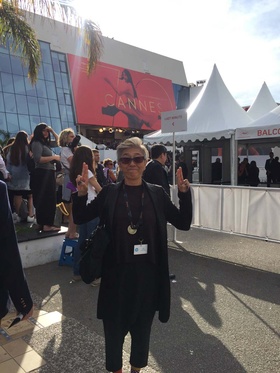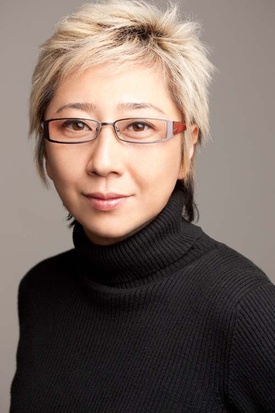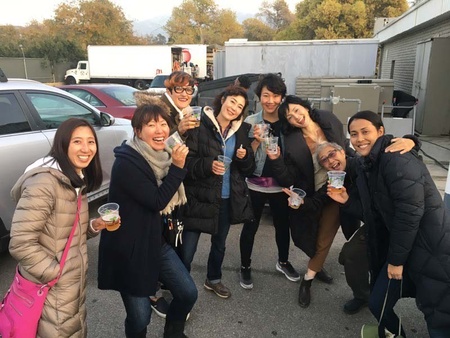"Gaining experience in Japan before moving to the US" was the right decision
Hair and makeup artist Akiko Matsumoto, who participated in the Japanese-American co-production film "Oh Lucy!", which was released in the United States in March 2018 and in Japan in April, has a 34-year career and has lived in the United States for 27 years.
Akiko was good at basketball and track and field, but due to a knee injury she had been suffering from, she gave up her dream of becoming an athlete and went on to study at Yamano Beauty College in Tokyo. In the 1980s, being a hairdresser was a career that many people aspired to.
After graduating, he joined a company that did hair and makeup for stage actors, and was put in charge of the stars' makeup from the time he was a new recruit. "At first, I was mainly in charge of hair and makeup, wigs, and beards, but I was really drawn to the makeup in 'The Phantom of the Opera,' and I started to want to try special effects makeup." However, when he asked his superiors to transfer him to the special effects makeup department, he was turned down. "In that case, I'll go to Hollywood, the home of the original, and learn from scratch," he decided, and in 1990, he traveled to the US, originally scheduled for six months. "Unlike today, it was a time when the Internet wasn't (as common) as it is now, so I came here with almost no information. As for English, I naively thought that I'd be able to speak it if I stayed with a host family (wry smile)."
However, in reality, things didn't go that way. First, she enrolled in an English school. However, her English didn't improve as much as she hoped in just six months. However, Akiko decided to enroll, thinking, "Even if my English isn't good enough, I have no choice but to go to makeup school." She made some connections and started out as a hair and makeup assistant, mainly for Japanese commercial shoots. After that, she obtained a green card, joined a union, and through word-of-mouth referrals, she has continued to get work in Hollywood to this day. She has been involved in over 70 films alone. Akiko says that moving to the US after gaining experience in Japan formed the foundation for her.
However, he says he still struggles with English: "Even in casual conversations at work, I get quiet when the topic turns to difficult topics like old TV shows, politics, and economics."
As mentioned above, jobs come one after another through referrals. Even so, after receiving a referral, he takes the interview stage by bringing along his past work. He says that the deciding factor for being hired is "not only skill and experience, but also chemistry with the director and producer." The direction of the hair and makeup is decided according to the director's wishes.
"In one production, the director instructed all the actors to wear no make-up, and my main job was to wipe away the special make-up and sweat. When I told the actresses that, they all started crying. It was also my job to act as a go-between to make sure the actors understood."
Japanese people who don't speak out and the different work styles in Japan and the US
"Since we usually spend a long time in close proximity to the actors, creating the right atmosphere is also important." Not only technique but also consideration is important.
Regarding interactions with actors, she shared the following episode: "We were working on a commercial, and one actress was very particular about her hairstyle, and it was difficult for her to agree, but in the end, she and the director were able to agree and the filming was completed without any problems. The next day, I received a text message from the actress saying, 'You never gave up. Thank you so much for spending so much time on me. The look on your face when you were styling my hair was so beautiful.' When I hear someone say thank you, I feel that it was worth doing, no matter how difficult the job is."
From this experience, Akiko says, "People who seem fussy at first glance are just strict and have strong policies, so they say it out loud. In reality, most of the people are nice, so it's rewarding." Currently, Akiko lives in a house in San Fernando Valley with her beloved cat. The reason she has a green card and has not taken the step to become a citizen is because she plans to return to Japan someday. "Japanese food is the key. When I retire, I want to return to Japan. On set, we have 100% American food from the catering service. I wish they would serve Japanese food, but at home I eat Japanese food, and when I eat out I either eat Japanese food or compromise and eat Asian food. Also, here you can't go anywhere without driving."
Apart from Japanese food, what other times do you feel that you are Japanese? "There was a time when I felt that I was different from American common sense. In one movie, I had already had a meeting with the director, so I didn't say anything at all in the first meeting. On the first day of shooting, when we had calmed down, the producer apologized to me. What he meant was that he thought I was stupid because I was quiet in the meeting, but when he saw me running the set at breakneck speed with four or five assistants, he thought I was amazing! and changed his mind. It's true that not speaking out is a bad habit of Japanese people. However, that experience made me try to speak up in meetings as much as possible." Now he says that he is grateful to the producer for telling him this.
She also reflected on the recent film "Oh! Lucy" directed by Hirayanagi Atsuko, which she was involved in: "It was a Japanese-American co-production, shot half in Japan and half in America. Many big-name cast and crew members were involved in the Japanese film. The film was nominated for Critics' Week at the 2017 Cannes Film Festival. Thanks to everyone's consideration, I was able to accompany Terashima Shinobu to the Cannes Film Festival as her makeup artist. Also, in 2018, the lead actress, Terashima Shinobu, was nominated for the Independent Spirit Awards. It was a hectic shoot on the American set, but I'm very grateful to have had the opportunity to be involved in a film that was nominated for such a major film festival. Japan and America have very different filming customs and styles, but I want to continue taking on new challenges without forgetting my own identity."
America gave us "improvements in technology" and "stress relief"
Outside of work, Akiko also volunteers to train the next generation and to collect donations for the Great East Japan Earthquake. "I can't hire as assistants people who don't have visas and aren't part of a union. So when I volunteer as a supervisor for Japanese stage productions, I leave the on-site work to young people. Regarding the earthquake, I've been donating the proceeds from a garage sale that I've been holding with my friends every March since 2011."
Finally, I asked her, "What has America given you?" "I think my technique has improved a lot because I was able to learn about the skin types, customs, and cultures of various races, including whites, blacks, and Spanish, in this place. I also became free from stress. In Japan, I was either working or sleeping. Here in America, I was able to enjoy my free time outside of work." Akiko answered with a cheerful expression in the comfortable backyard planted with fruit trees.
reference:
" Oh! Lucy " official website
* * * * *
Akiko will be the hair and makeup supervisor for the stage production this summer.
"BURAI II - THE SWORDS OF SORROW. THE TALE OF A SAMURAI GHOST"
July 6th - July 22nd, 2018
Edgemar Center for the Arts, Santa Monica, California
© 2018 Keiko Fukuda








